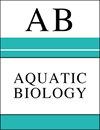Temporal and spatial dynamics of the invasive red king crab and native brachyuran and anomuran larvae in Norwegian waters
IF 0.8
4区 生物学
Q3 MARINE & FRESHWATER BIOLOGY
引用次数: 1
Abstract
This study investigates the temporal and spatial patterns of larval stages of the invasive red king crab Paralithodes camtschaticus (RKC) and co-existing native brachyurans and anomurans in a Norwegian fjord. It is one of few field studies describing the larval stage of native and invasive brachyurans and anomurans in the southern Barents Sea. Larvae were collected at 6 to 18 stations at roughly 1 to 2 mo intervals over a 1.5-yr period. To help explain timing in hatch of RKC larvae, the reproductive state of females was determined. The first larval stage of RKC was found in higher abundances in shallow bays, reflecting the spawning migrations of reproducing females. RKC was the first species among anomurans and brachyurans to release their larvae in Norwegian waters, and due to an extended larval release (January−May) their larvae occurred for the longest period of time in the water column. The native boreo-Arctic Pagurus pubescens and Hyas araneus released their larvae early in the year, starting in March. In contrast, larvae of the native boreal Pagurus bernhardus, Hyas coarctatus and Munida sp. were observed later in spring and summer. The combination of protracted hatching, high fecundity and high adult abundance of RKC are likely strong contributing factors to the species’ successful establishment in the southern Barents Sea and could favour the dispersal of RKC south along the Norwegian coast and potentially north into Arctic shelf areas.挪威海域入侵红王蟹与本地短尾蟹和异尾蟹幼虫的时空动态
研究了挪威峡湾入侵红王蟹(Paralithodes camtschaticus, RKC)和共存的本地短尾纲和异尾纲幼虫期的时空格局。这是对巴伦支海南部本地和入侵短尾纲和异尾纲幼虫期进行的为数不多的实地研究之一。在1.5年的时间里,每隔1至2个月采集6至18个站点的幼虫。为了解释RKC幼虫的孵化时间,测定了雌性的生殖状态。RKC的第一幼虫期在浅海湾中丰度较高,反映了繁殖雌性的产卵迁徙。RKC是挪威水域中最早释放幼虫的异目目和短目目动物,由于其幼虫释放时间较长(1 - 5月),其幼虫在水体中出现的时间最长。当地的北北极地区的短毛卷毛蝶和海丝蝶的幼虫在年初释放,从3月开始。在春夏两季较晚的时间内,可观察到北方土生昆虫Pagurus bernhardus、Hyas coarctatus和Munida sp.的幼虫。长时间的孵化,高繁殖力和高成虫丰度的结合可能是RKC在巴伦支海南部成功建立的重要因素,并可能有利于RKC沿挪威海岸向南扩散,并可能向北扩散到北极大陆架地区。
本文章由计算机程序翻译,如有差异,请以英文原文为准。
求助全文
约1分钟内获得全文
求助全文
来源期刊

Aquatic Biology
生物-海洋与淡水生物学
CiteScore
2.70
自引率
0.00%
发文量
7
审稿时长
3 months
期刊介绍:
AB publishes rigorously refereed and carefully selected Feature Articles, Research Articles, Reviews and Notes, as well as Comments/Reply Comments (for details see MEPS 228:1), Theme Sections, Opinion Pieces (previously called ''As I See It'') (for details consult the Guidelines for Authors) concerned with the biology, physiology, biochemistry and genetics (including the ’omics‘) of all aquatic organisms under laboratory and field conditions, and at all levels of organisation and investigation. Areas covered include:
-Biological aspects of biota: Evolution and speciation; life histories; biodiversity, biogeography and phylogeography; population genetics; biological connectedness between marine and freshwater biota; paleobiology of aquatic environments; invasive species.
-Biochemical and physiological aspects of aquatic life; synthesis and conversion of organic matter (mechanisms of auto- and heterotrophy, digestion, respiration, nutrition); thermo-, ion, osmo- and volume-regulation; stress and stress resistance; metabolism and energy budgets; non-genetic and genetic adaptation.
-Species interactions: Environment–organism and organism–organism interrelationships; predation: defenses (physical and chemical); symbioses.
-Molecular biology of aquatic life.
-Behavior: Orientation in space and time; migrations; feeding and reproductive behavior; agonistic behavior.
-Toxicology and water-quality effects on organisms; anthropogenic impacts on aquatic biota (e.g. pollution, fisheries); stream regulation and restoration.
-Theoretical biology: mathematical modelling of biological processes and species interactions.
-Methodology and equipment employed in aquatic biological research; underwater exploration and experimentation.
-Exploitation of aquatic biota: Fisheries; cultivation of aquatic organisms: use, management, protection and conservation of living aquatic resources.
-Reproduction and development in marine, brackish and freshwater organisms
 求助内容:
求助内容: 应助结果提醒方式:
应助结果提醒方式:


